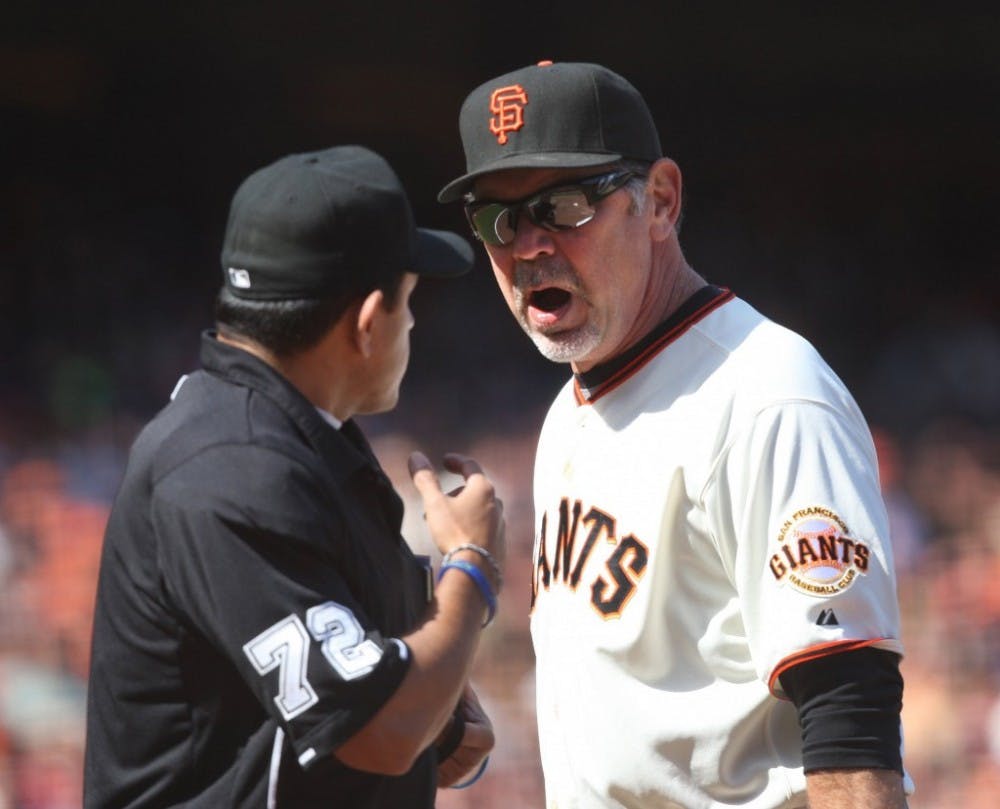To the chagrin of many baseball die-hards, Major League Baseball instituted an expanded instant replay system for the 2014 season.
This seemed inevitable, as all three of the other major sports leagues in the United States have had extensive replay systems in place for years. But just days into this season, the flaws of baseball’s new system have been exploited.
One issue that has plagued all leagues that use instant replay is a lack of quality camera angles. When reviewing a play, umpires are at the mercy of the camera crews that broadcast the game for each team. Many times, these angles don’t provide the necessary conclusive evidence that umpires need to overturn a call.
During the April 2 game between the Miami Marlins and the Colorado Rockies, this exact predicament played out. During the fourth inning, Marlins second baseman Derek Dietrich fielded a ground ball and proceeded to throw it to shortstop Adeiny Hechavarria in an attempt to force the runner out. But Hechavarria was forced to stretch away from the second base bag to make the catch, while still attempting to keep his foot on the base. Umpire Jerry Layne ruled the runner safe on the play, leading to Marlins manager Mike Redmond to challenge the play.
After review, the call on the field was upheld, and the game was resumed. The Rockies would go on to score three runs in the inning and win the game, 6-5. In the end, the play reviewed in the fourth inning was very important in determining the outcome of the game. Redmond said after the game that he thought there was evidence in the replay to overturn the call.
The question to be asked is this: Why can’t major sports leagues get more reliable camera angles?
Major League Baseball surely invested millions of dollars into the new replay system, so why not have a separate set of league-mandated cameras that provide a better angle of the plays?
Unfortunately, this is a problem that will never be solved in major sports. In many cases, the required camera angle is just not there to overturn a call. It is still astounding, though, that the league could go through so much to institute instant replay and then get the calls wrong even after reviewing the play.
The new system gives managers one challenge in the first six innings of the game, unless a challenge is used and the play is overturned. In this case, the manager would be given a second challenge to use. After the beginning of the seventh inning, all reviews must be initiated by an umpire.
San Francisco Giants manager Bruce Bochy found himself on the wrong side of this rule during his team’s April 1 game against the Arizona Diamondbacks. In the bottom of the fourth inning, Giants starting pitcher Matt Cain attempted to pick off Arizona’s A.J. Pollock at first base. Umpire Chris Guccione called Pollock safe on the play, though Bochy and the Giants thought he was out. Bochy challenged the call, but it was upheld by the umpiring crew. As a result, Bochy was left without a challenge for the rest of the game.
http://www.youtube.com/watch?v=YFfkLvQ2Jjs
Later in the inning, with runners on second and third, Cain threw an errant pitch that bounced away from catcher Buster Posey, prompting Pollock to attempt to score from third. Posey then got the ball to Cain, who placed the tag on Pollock, but once again, the umpire ruled Pollock safe. It looked as though Cain placed the tag on Pollock’s cleat before he touched the plate, but the Giants were out of luck, as Bochy had lost his lone challenge just minutes before. The Giants went on to lose the game by one run.
Now, the reason that Major League Baseball expanded instant replay was to ensure that more plays are called correctly. But since such an extensive change was made, EVERY call should be able to be made correctly as a result. The league’s new system is not getting every call right, and I have provided only two examples. If there is this much controversy over the system just days into the season, imagine how much there will be come this summer?
The camera angles given to umpires are unreliable, and managers are too limited in their ability to review plays. Major League Baseball has to be worried about the future of its lauded system, one that so much money and resources were put into. At this point, I think it’s safe to consider it a work in progress.


